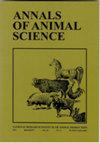植物衍生酚类化合物的小型综述,特别强调其在水产养殖中的可能应用和有益用途
IF 2.2
4区 农林科学
Q2 AGRICULTURE, DAIRY & ANIMAL SCIENCE
引用次数: 6
摘要
摘要大多数抗生素在鳍鱼和虾养殖场的使用受到限制和禁止,原因有几个,包括它们在水生环境中的持久性、相对较高的价格以及它们促进抗生素耐药性细菌存在的能力。因此,寻找经济、自然和环境安全的替代品非常重要。利用多酚、富含多酚的植物和植物衍生的酚类化合物来促进水生动物的健康和福利,可能是开发水产饲料和保持水产养殖业可持续性的有效策略。几种植物富含多种生物活性功能成分,如植物化学物质和多酚。酚类化合物可以成功地用作天然免疫刺激剂,以提高鳍鱼和虾对几种细菌、病毒和寄生虫感染的免疫力,从而可以取代抗菌剂的使用。除了它们在改善生长性能、肠道健康和增强治疗动物抗氧化能力方面的潜在作用外。尽管使用植物衍生酚类化合物的趋势是提高水产饲料功能和水产养殖业发展的一个新的领先时代,但仍有基本的需求和必要描述它们的作用模式以及在提高生产率、抗氧化活性、免疫状态,养殖鱼类和对虾的抗病性。本文章由计算机程序翻译,如有差异,请以英文原文为准。
A mini-review on plant-derived phenolic compounds with particular emphasis on their possible applications and beneficial uses in aquaculture
Abstract The use of most antibiotics has been restricted and banned in finfish and shrimp farms due to several reasons comprising their long-lasting persistence in aquatic environments, relatively high prices, and their ability to promote the existence of antibiotic-resistant bacteria. Hence, finding economical, natural, and environmentally safe alternatives is of great importance. The use of polyphenols, polyphenol-rich plants, and plant-derived phenolic compounds for promoting aquatic animal health and welfare could be from the effective strategies for developing aquafeed and maintaining the sustainability of the aquaculture industry. Several plants are gorgeous in various bioactive functional ingredients known as phytochemicals and polyphenols. Phenolic compounds could be successfully used as natural immunostimulants in order to raise the immunity of finfish and shrimp species against several bacterial, viral, and parasitic infections and thus may replace the use of antimicrobial agents. Besides their potential roles for improvement of the growth performance, intestinal health, and enhancing the antioxidant capacity of the treated animals. Even though the trend of using plant-derived phenolic compounds is a new and leading era for the improvement of the functionality of aquafeed and the development of the aquaculture industry, there are fundamental needs and necessities to describe a clear understanding of their modes of action and potential roles in the improvement of the production rates, antioxidant activity, immune status, and disease resistance of farmed fish and shrimp.
求助全文
通过发布文献求助,成功后即可免费获取论文全文。
去求助
来源期刊

Annals of Animal Science
农林科学-奶制品与动物科学
CiteScore
4.00
自引率
5.30%
发文量
138
审稿时长
6-12 weeks
期刊介绍:
Annals of Animal Science accepts original papers and reviews from the different topics of animal science: genetic and farm animal breeding, the biology, physiology and reproduction of animals, animal nutrition and feedstuffs, environment, hygiene and animal production technology, quality of animal origin products, economics and the organization of animal production.
 求助内容:
求助内容: 应助结果提醒方式:
应助结果提醒方式:


